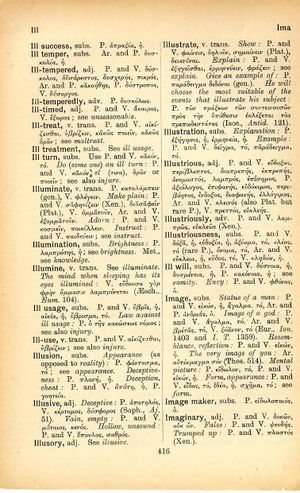illuminate: Difference between revisions
From LSJ
Ὁ συκοφάντης ἐστὶν ἐν πόλει λύκος (τοῖς πέλας λύκος) → Calumniator, quemquem novit, huic lupus'st → Der Denunziant lebt in der Stadt gleichsam als Wolf (ist seinen Nachbarn wie ein Wolf)
(6_8) |
(D_4) |
||
| Line 8: | Line 8: | ||
{{Lewis | {{Lewis | ||
|lshtext=<b>illūmĭnātē</b>: adv., v. [[illumino]]. | |lshtext=<b>illūmĭnātē</b>: adv., v. [[illumino]]. | ||
}} | |||
{{Gaffiot | |||
|gf=<b>illūmĭnātē</b> <b>([[inl-]])</b>, avec l’éclat du style [emploi des figures] : Cic. de Or. 3, 53. | |||
}} | }} | ||
Revision as of 06:56, 14 August 2017
English > Greek (Woodhouse)
v. trans.
P. καταλάμπειν (gen.), V. φλέγειν. Make plain: P. and V. σαφηνίζειν (Xen.), διασαφεῖν (Plat.), V. ὀμματοῦν, Ar. and V. ἐξομματοῦν. Adorn: P. and V. κοσμεῖν, ποικίλλειν. Instruct: P. and V. παιδεύειν; see instruct.
Latin > English (Lewis & Short)
illūmĭnātē: adv., v. illumino.
Latin > French (Gaffiot 2016)
illūmĭnātē (inl-), avec l’éclat du style [emploi des figures] : Cic. de Or. 3, 53.

